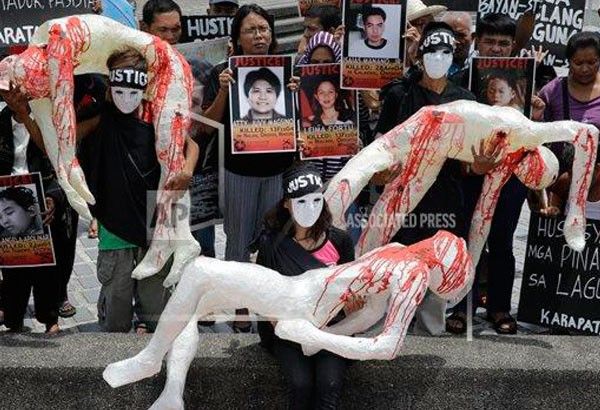Continuing reparations for ML victims pushed

MANILA, Philippines — Human rights advocates, including former Senate president Aquilino Pimentel Jr., are pushing for continuing reparations process for thousands of victims of the martial law regime.
During the commemoration of the martial law declaration by the late dictator Ferdinand Marcos at the Commission on Human Rights on Friday, Pimentel said there are a lot of unnamed victims who have yet to receive reparation from the government.
“We should continue the search. This is not the end. This is only the beginning,” he said in Filipino. “I know for a fact that there are many who were not mentioned, people who deserve more the attention of the government and to get paid for their sacrifice.”
Pimentel was among the 125 victims who did not file claims but whose cases were still investigated and recognized by the now-defunct Human Rights Victims’ Claims Board (HRVCB).
The two-year reparations process, which ended this year, has approved claims of more than 11,000 victims of human rights violations during the dictatorship.
While recognition and reparations have already been handed out by the government, Pimentel dismissed calls that it is now time to move on from the atrocities during the martial law.
“We should still get that money hidden in Switzerland to pay the people. Not because you already paid some (means that it is already finished). What about the rest? You only will have partial justice if you allow that to happen,” he added.
The Presidential Commission on Good Government, the agency tasked to run after the ill-gotten wealth of the Marcoses, said it has already recovered over $3.6 billion from the late dictator’s family and their cronies.
Estimates note that the total amount of plundered wealth could reach as much as $10 billion. Much of that remains missing, including expensive artworks purchased by former first lady and incumbent Ilocos Norte Rep. Imelda Marcos.
Pimentel said the funds could have been used not just to pay the victims but also fund other social projects of the government.
“There is always that possibility (to recover). Whether it will happen or not, if President Digong (Duterte) will see that the people want the recovery of the missing wealth, he will do it,” he said when asked about the close relationship of the President and the Marcoses.
Pimentel, who was one of those who fiercely went against the dictatorship, was jailed four times during martial law. The first time was when he became a delegate to the 1971 Constitutional Convention and was detained in Camp Crame for three months for opposing the 1973 Constitution, which gave Marcos dictatorial powers.
The second instance he was imprisoned was when he led a demonstration against the Interim Batasang Pambansa elections in 1978; again in 1983 on trumped up rebellion charges and in 1985 for allegedly participating in an ambush in Cebu City.
Pimentel wrote a book, “Martial Law in the Philippines: My Story” that detailed how he and other Marcos critics suffered at the hands of Marcos’ military, all a result of their refusal to embrace the dictatorship.
New reparations law
Agreeing with Pimentel, CHR chair Chito Gascon said there is a need for continuing recognition and reparations for victims of martial law.
He noted that many victims were not among the 11,000 approved claims by the HRVCB.
He said they will write to Pimentel’s son Sen. Aquilino “Koko” Pimentel III for the possible filing of a bill that would provide for such.
“We hope that that will be the case so everyone will get the justice that they deserve,” Gascon said.
“We have a two-pronged approach because there are many other names that are not there. One is to ask Congress to open up a new reparations process so that those who might seek reparations might be allowed. Second is for them to authorize the Memorial Commission to add names on a yearly basis (to the memorial),” he added.
During the time of former president Benigno Aquino III, the Human Rights Victims Reparation and Recognition Act was signed into law on Feb. 25, 2013.
- Latest
- Trending





























